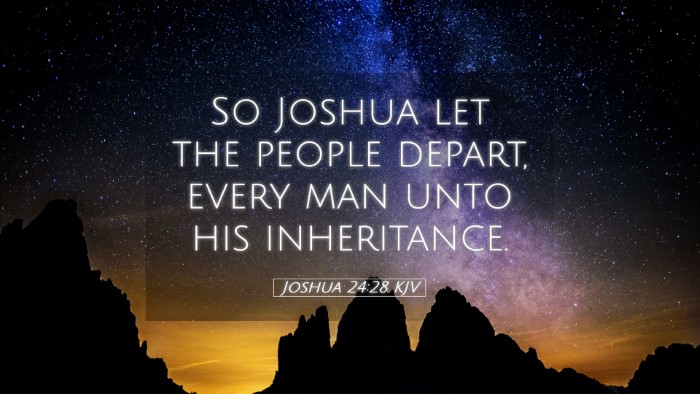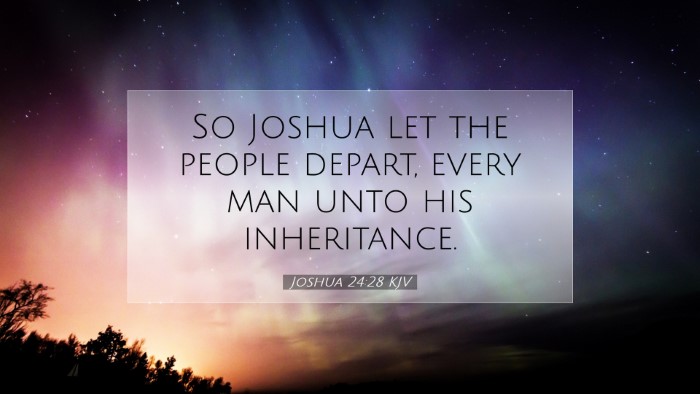Bible Commentary on Joshua 24:28
Verse Context: Joshua 24:28 reads, "Then Joshua sent the people away, every man to his inheritance." This verse concludes the significant address given by Joshua to the Israelites, wherein he challenged them to choose whom they would serve.
Overview and Significance
This segment of Scripture stresses the conclusion of a pivotal era in the history of Israel as they settle in the Promised Land. The verse encapsulates Joshua's leadership and the people's response to God's covenant.
Historical and Theological Implications
-
Transition of Leadership:
Joshua's role as the leader is critical here. His sending away of the people marks a transition from communal leadership under a mighty military commander to individual responsibility for their inheritance. This change emphasizes personal accountability in the faith community.
-
Fulfillment of Promises:
The inheritance spoken of is tied to God's promises to the patriarchs. This highlights the faithfulness of God in fulfilling His covenantal promises to the people of Israel.
Insights from Public Domain Commentaries
Matthew Henry
Matthew Henry emphasizes the importance of this verse by noting that it marks the end of a long journey for Israel. He comments that the people had now received the land of Canaan, which was a physical representation of God’s promises. Henry articulates the responsibility that comes with the inheritance; it is not merely a gift but a charge to live in obedience to God. He suggests that each Israelite had the opportunity to reflect on their personal faith and commitment to God upon leaving Joshua, each one taking their inheritance as a reminder of divine faithfulness and their obligation to uphold the covenant.
Albert Barnes
Albert Barnes provides a systematic analysis of this verse, interpreting the significance of both Joshua's role and the people's actions. He notes that Joshua's directive epitomizes the culmination of biblical history regarding the land. Every tribe and family returning to their allotted territory signifies a restored order and governance under God’s direction. Furthermore, Barnes mentions that this was an opportunity for individual and collective worship, where Israelites were encouraged to serve their God, emphasizing the importance of active faith in daily life.
Adam Clarke
Adam Clarke offers a profound philosophical exploration of the idea of inheritance. He posits that Joshua, by sending the people to their inheritances, calls forth the notion of a spiritual inheritance alongside the physical one. Clarke urges his readers to consider the implications of serving God in their new homes, emphasizing worship and fidelity to God’s commands as they settle into their new lives. He highlights that the act of "sending away" carries connotations of empowerment; the people are to choose for themselves their way of life, a privilege that comes with being part of God's chosen community.
Practical Applications
-
Personal Responsibility:
As modern believers reflect upon this passage, there is a call to recognize personal responsibility in their faith. Just as the Israelites were sent to their distinct inheritances, Christians are called to live out their faith daily, making choices that reflect their commitment to God.
-
Recognition of God’s Faithfulness:
The remembrance of God’s faithfulness should compel believers to respond in gratitude and obedience, serving as a reminder that their spiritual inheritance in Christ requires active engagement in His mission.
-
Community and Individual Calling:
Joshua's leadership highlights the balance between corporate and individual responsibilities in the faith community. Believers are encouraged to both uphold communal values while also discerning their unique roles within God’s plan.
Conclusion
Joshua 24:28 serves as a crucial reminder to pastors, students, theologians, and Bible scholars that faith is deeply individual yet inherently communal. It emphasizes the significance of active faith and God's faithfulness in the lives of His people. The mandate given by Joshua resonates through the ages, calling believers to choose daily whom they will serve and to recognize the great inheritance they have received in Christ.


